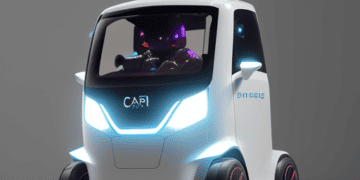Uber Eats Japan has embarked on a collaborative venture with Mitsubishi Electric Corporation and Cartken to initiate an autonomous robot food delivery service in Tokyo. This innovative service, which utilizes robots designed by Cartken and powered by AI technology, is set to launch by the end of March 2024. Following the United States, Japan will become the second nation globally to experience Uber Eats’ robotic delivery service.
Shintaro Nakagawa, CEO of Uber Eats Japan, expressed enthusiasm about the partnership, highlighting the addition of robotic delivery as a new method alongside existing delivery modes like bikes, motorbikes, light cargo, and foot delivery. Nakagawa emphasized the potential of autonomous robots in addressing labor shortages and enhancing delivery method options over the medium to long term, aiming to offer customers and merchants both novel experiences and dependable service.
Shoji Tanaka, General Manager of the Electric Development Division at Mitsubishi’s Advanced Application Development Center, discussed the role of robot delivery as a solution to the escalating logistics challenges. Through collaboration with Cartken, Mitsubishi Electric aims to further the adoption of robot delivery services in Japan. Tanaka also shared future ambitions to integrate these autonomous delivery robots with Mitsubishi Electric’s infrastructure projects within buildings and factories, aiming to expand the service to various indoor settings and enhance the user experience with advanced convenience.
This initiative represents a significant step towards integrating robotic technology into everyday logistics and delivery services, reflecting a broader trend towards automation and technological innovation in addressing contemporary challenges.
In a significant advancement for the food delivery industry, Uber Eats Japan has announced a pioneering initiative to launch an autonomous robot delivery service in Tokyo. This venture, a collaborative effort with Mitsubishi Electric Corporation and robotics firm Cartken, is poised to revolutionize the way food is delivered. Utilizing cutting-edge robots designed by Cartken and leveraging advanced AI technology, this service is expected to commence by the end of March 2024, marking Japan as the second country worldwide to adopt Uber Eats’ robotic delivery after its introduction in the United States.
Shintaro Nakagawa, CEO of Uber Eats Japan, shared his excitement about this innovative partnership, noting that robotic delivery will complement the platform’s existing array of delivery methods, including bicycles, motorbikes, light vehicles, and on-foot couriers. Nakagawa highlighted the transformative potential of autonomous delivery robots in mitigating labor shortages and diversifying delivery options. He underscored the company’s commitment to offering both customers and merchants a reliable and uniquely delightful delivery experience, foreseeing a future where robots play an integral role in the delivery ecosystem.
Shoji Tanaka, General Manager of the Electric Development Division at Mitsubishi’s Advanced Application Development Center, spoke on the strategic importance of robot delivery in addressing the growing challenges within the logistics sector. The collaboration with Cartken aims not only to popularize robot delivery services in Japan but also to pioneer new avenues for technological integration. Tanaka revealed ambitious plans to incorporate these autonomous delivery robots into Mitsubishi Electric’s broader infrastructure projects, including buildings and factories, thereby extending robot delivery services to a variety of indoor environments and significantly enhancing the end-user experience with unparalleled convenience.
This initiative signifies a major leap forward in the application of robotic technology to everyday logistics and delivery operations, highlighting the shift towards greater automation and technological innovation in solving modern logistical challenges. The partnership between Uber Eats, Mitsubishi Electric, and Cartken is a testament to the collaborative effort required to bring such advanced solutions to market, setting a new standard for the delivery industry and potentially influencing similar innovations globally.
As the project moves forward, the teams behind this initiative are focused on refining the technology, ensuring safety and efficiency, and exploring further applications of autonomous robots in logistics. This endeavor not only represents a milestone for Uber Eats and its partners but also signals a transformative shift in delivery services, promising to impact the way businesses and consumers interact in an increasingly digital and automated world.
Breaking supply chain news is just a click away at The Supply Chain Report. Enhance your knowledge of international trade at ADAMftd.com with free tools.
#UberEatsJapan #MitsubishiElectric #Cartken #AutonomousDelivery #RobotDelivery #AIpoweredDelivery #TokyoTech #FoodDeliveryInnovation #SmartLogistics #FutureOfDelivery #TechInnovation #AutomationRevolution #DeliveryRobots #RoboticsInJapan #LogisticsSolutions #AdvancedAI #DigitalTransformation #AutomationInTokyo #InnovativeDelivery #AutonomousTechnology
















